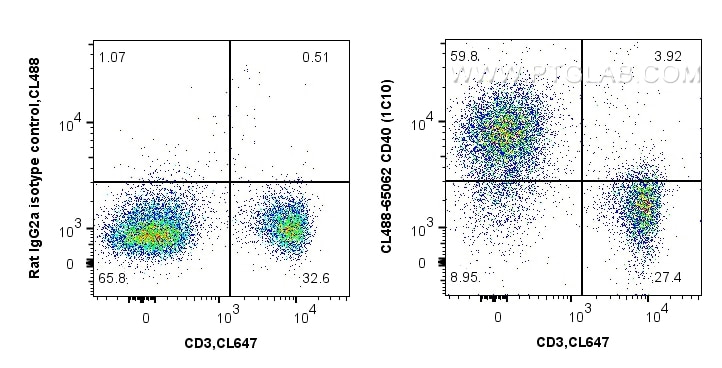Tested Applications
| Positive FC detected in | C57BL/6 mouse splenocytes |
Recommended dilution
| Application | Dilution |
|---|---|
| Flow Cytometry (FC) | FC : 2 ug per 10^6 cells in 100 μl suspension |
| This reagent has been tested for flow cytometric analysis. It is recommended that this reagent should be titrated in each testing system to obtain optimal results. | |
| Sample-dependent, Check data in validation data gallery. | |
Product Information
CL488-65062 targets CD40 in FC applications and shows reactivity with Mouse samples.
| Tested Reactivity | Mouse |
| Host / Isotype | Rat / IgG2a, kappa |
| Class | Monoclonal |
| Type | Antibody |
| Immunogen |
sCD40 Predict reactive species |
| Full Name | CD40 antigen |
| GenBank Accession Number | BC029254 |
| Gene Symbol | Cd40 |
| Gene ID (NCBI) | 21939 |
| RRID | AB_2883157 |
| Conjugate | CoraLite® Plus 488 Fluorescent Dye |
| Excitation/Emission Maxima Wavelengths | 493 nm / 522 nm |
| Form | Liquid |
| Purification Method | Affinity purification |
| UNIPROT ID | P27512 |
| Storage Buffer | PBS with 0.09% sodium azide and 0.5% BSA, pH 7.3. |
| Storage Conditions | Store at 2-8°C. Avoid exposure to light. Stable for one year after shipment. |
Background Information
CD40, also named as TNFRSF5 and Bp50, is a type I transmembrane protein that belongs to the tumor necrosis factor-R (TNF-R) family (PMID: 10647992). CD40 is expressed on B cells, dendritic cells (DCs), monocytes, platelets, and macrophages as well as by non-hematopoietic cells such as myofibroblasts, fibroblasts, epithelial, and endothelial cells (PMID: 19426221). It is a receptor for TNFSF5/CD40LG. CD40L/CD40 interactions are essential for immunoglobulin (Ig) isotype switching, germinal center formation and the development of B cell memory (PMID: 7516405; 11675497).
Protocols
| Product Specific Protocols | |
|---|---|
| FC protocol for CL Plus 488 CD40 antibody CL488-65062 | Download protocol |
| Standard Protocols | |
|---|---|
| Click here to view our Standard Protocols |




